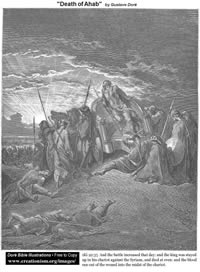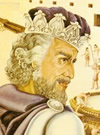The following post is from a young friend of mine who is an aspiring author. I have had the privilege of reading some of her writing, and am amazed at the quality and depth of thought that she conveys. I asked if she would consider writing a guest post for the Pajama School Blog, and this is what the Lord laid on her heart. I’m sure you will be blessed, as I was, by this captivating post from Sarah:
Close your eyes for a moment and imagine a room. Not just any room; a long, spacious room with colorful patterns dancing across the tiled floor. A room with intricately carved pillars supporting the flat roof. A room with open floor-to-ceiling windows and doors, letting in a soft Mediterranean breeze, carrying with it a tang of the sea. Now imagine a golden throne; on it sits a figure arrayed in purple, scarlet, and golden robes. He is oblivious to the beautiful gardens outside, blossoming with color; oblivious to all the splendor he lives among; oblivious to all but the matters of war and bloodshed.
 A hot debate is going on.
A hot debate is going on.
Ahab, king of Israel, is an ambitious man. Strengthened and emboldened by his recent alliance with Jehoshaphat, king of Judah, he wishes to attack Ramoth Gilead with Jehoshaphat’s help. Officially, the city belongs to Israel; but the king of Aram still holds it. To take it back is the king’s goal. But now Ahab-the same Ahab who sought Elijah’s life for so long-is being forced to inquire of the prophets of the Lord.
Jehoshaphat was stubborn, Ahab inwardly fumed. Determined to have his way, Jehoshaphat refused to march to battle without the Lord’s blessing. “My horses and my people are as your horses and people,” he had said. Ahab was satisfied. But then Jehoshaphat came up with his fatal plan; “Inquire for the word of the Lord today.”
Jehoshaphat was a coward, Ahab thought. He was trying to escape a war by hiding behind his God! Oh well, the king smugly told himself. Even though he still grumbled, he sent for the prophets of the Lord-his prophets of the Lord. Jehoshaphat wouldn’t get out of this one; Ahab knew these four hundred men. They would tell him what he wanted to hear. He would have his war-Ramoth Gilead would be his!
Just as Ahab predicted to himself, all four hundred “prophets” agreed with him. “Go!” they said. “The Lord will give Ramoth Gilead into your hand.”
Jehoshaphat shook his head, to Ahab’s dismay. Looking sadly over the assembled four hundred, the king of Judah cried, “Is there not still a prophet of the Lord here, that we may inquire of Him?” Imagine Ahab’s dismay as Jehoshaphat sees through his ruse. He is forced to call for Micaiah, a true prophet and follower of the living God. Micaiah does as Ahab knows he will, as he always does-prophesy that the hand of the Lord will be against him.
 There’s much drama left in the story-how Ahab was angry with Micaiah for his words of truth; how he went out to battle in spite of Micaiah’s warning, disguised as a common soldier while Jehoshaphat carried on the charade of being king of Israel; how Jehoshaphat was miraculously saved from death when he cried out to the Lord; how a Syrian bowman, drawing at random, slew Ahab, king of Israel, just as Micaiah prophesied.
There’s much drama left in the story-how Ahab was angry with Micaiah for his words of truth; how he went out to battle in spite of Micaiah’s warning, disguised as a common soldier while Jehoshaphat carried on the charade of being king of Israel; how Jehoshaphat was miraculously saved from death when he cried out to the Lord; how a Syrian bowman, drawing at random, slew Ahab, king of Israel, just as Micaiah prophesied.
Yet through all the intrigue and scheming, through the romantic setting of ancient Israel, the one part of the story that sticks in my mind is Jehoshaphat’s cry.
“Is there not still a prophet of the Lord here, that we may inquire of Him?”
Is there not one man left in all Israel that has the faith to take a stand before a cruel earthly king who has the power to take his life? Is there not one man who has a voice he is willing to use for the Lord, regardless of the consequences? Is there not one man with the courage left to boldly proclaim the words of the Lord?
Is there not one man, any man, left in all Israel, who still believes that the Lord is truly God?
Israel, c. 850 B.C., was in turmoil. Faith in the Lord was not always looked upon kindly. Under Ahab and Jezebel, persecution of the followers of the living God was ruthless and complete. Only seven thousand Israelites remained who had not embraced the worship of Baal-only seven thousand of God’s chosen people stayed true to Him. Unlike earlier years, to know the Lord was the exception, not the norm.
 When you come to think of it, the Israel of 1 Kings 22 is not so much different than the America of today. We, as Christians, are not hounded, chased, exiled, driven from our homes, and killed for our beliefs; but we are pressured, and in some cases restricted, from freely voicing what we believe. We may not face certain imprisonment like Micaiah did, yet Jehoshaphat’s appeal still rings true.
When you come to think of it, the Israel of 1 Kings 22 is not so much different than the America of today. We, as Christians, are not hounded, chased, exiled, driven from our homes, and killed for our beliefs; but we are pressured, and in some cases restricted, from freely voicing what we believe. We may not face certain imprisonment like Micaiah did, yet Jehoshaphat’s appeal still rings true.
Is there still one of us who will stand up against the perverted culture we live in, to use our voice, our courage, and our faith to tell others of the hope of Christ’s message? We may be ridiculed, mocked, or despised for the stand we make; but the possibility of worse did not stop Micaiah, and it should not stop us. We have no reason to fear.
Think about it. The God who created the entire universe loved us so much that He sent His only Son to die for us. He listens whenever, wherever, and however we pray to Him, even if we’re just coming to Him once more to voice selfish requests or complain about the way others treat us. This same God has promised in His Word to protect us from harm if we will but follow Him.
If our God is for us, then who can be against us?
What excuse do we have to not proclaim Christ’s grace to others, even if it means stepping on toes or hurting feelings? Sometimes the truth hurts or offends, like it did to Ahab. That doesn’t make truth lose its relevance. The truth about America today is that our country is not what it was when the Founding Fathers prayed for guidance as they chose to break from the most powerful empire in the world. We have spiraled quickly downward, losing conviction, principles, morals, ethics, standards, and values – ideals that we have fought so long and given so much to hold. Ultimately we are losing our freedom, just as the Israelites eventually lost theirs for turning from the Lord. But our story doesn’t have to end in slavery, as theirs did.
Have you ever wondered what would have happened if those seven thousand Israelites still faithful would have been as bold as Elijah and Micaiah? Maybe they could have turned their entire nation back to God. What would happen if we took a stand like Micaiah, proclaiming the truth to our fellow Americans? Maybe we could transform our entire nation, bringing us back to what so many died for.
Take a stand? Sounds easy. It isn’t. It takes nerve, reliance on God, a willing spirit, and a lot of prayer. But if we choose, by faith, to be the one left whom people can inquire the truth of, the Lord will give us the courage we need, and the words to speak. All we have to do is answer Jehoshaphat’s cry.
Sarah lives at home with her parents and four siblings. She has been homeschooled her whole life, and loves spending time with her family.
Images from: aeragon.com, baptisttwentyone.com, creationism.org
